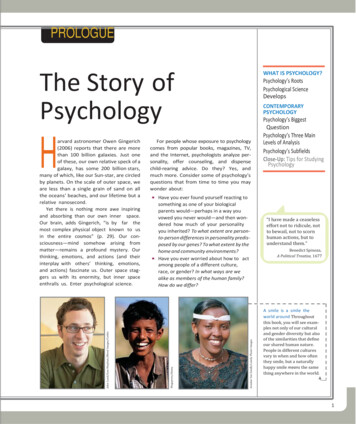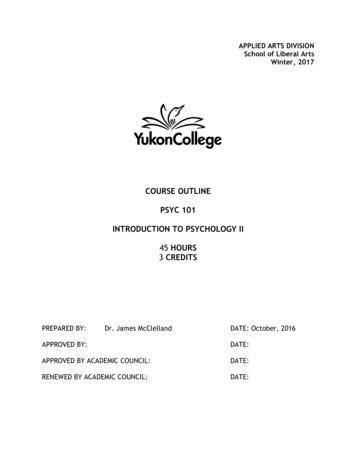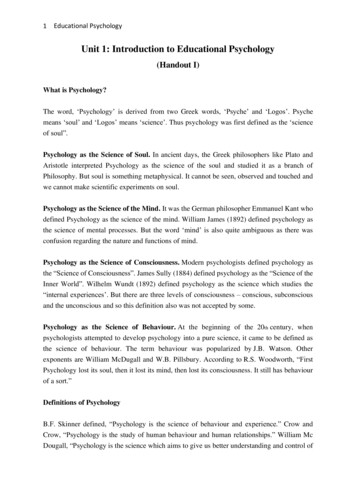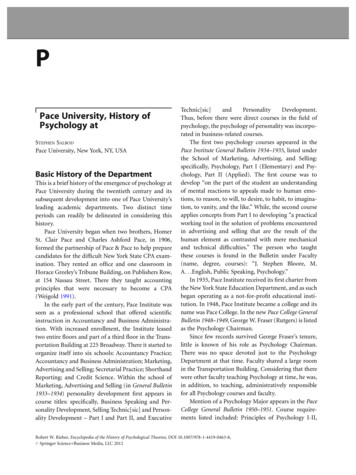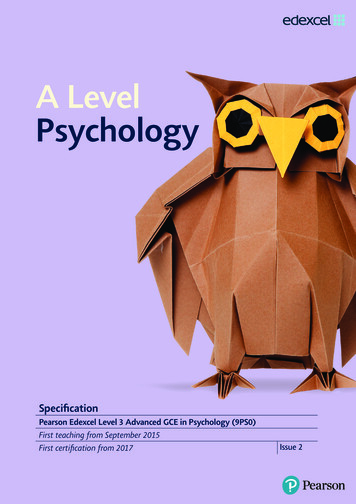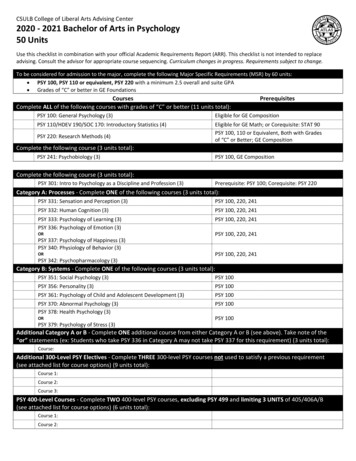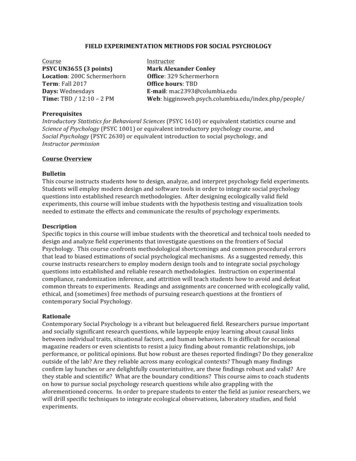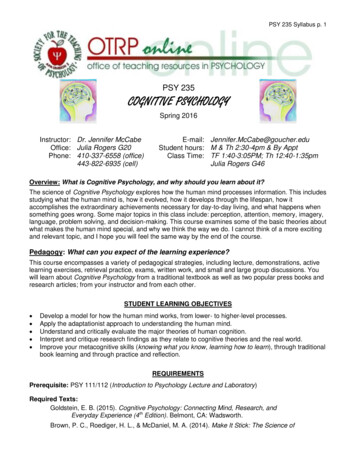
Transcription
PSY 235 Syllabus p. 1PSY 235COGNITIVE PSYCHOLOGYSpring 2016Instructor: Dr. Jennifer McCabeOffice: Julia Rogers G20Phone: 410-337-6558 (office)443-822-6935 (cell)E-mail: Jennifer.McCabe@goucher.eduStudent hours: M & Th 2:30-4pm & By ApptClass Time: TF 1:40-3:05PM; Th 12:40-1:35pmJulia Rogers G46Overview: What is Cognitive Psychology, and why should you learn about it?The science of Cognitive Psychology explores how the human mind processes information. This includesstudying what the human mind is, how it evolved, how it develops through the lifespan, how itaccomplishes the extraordinary achievements necessary for day-to-day living, and what happens whensomething goes wrong. Some major topics in this class include: perception, attention, memory, imagery,language, problem solving, and decision-making. This course examines some of the basic theories aboutwhat makes the human mind special, and why we think the way we do. I cannot think of a more excitingand relevant topic, and I hope you will feel the same way by the end of the course.Pedagogy: What can you expect of the learning experience?This course encompasses a variety of pedagogical strategies, including lecture, demonstrations, activelearning exercises, retrieval practice, exams, written work, and small and large group discussions. Youwill learn about Cognitive Psychology from a traditional textbook as well as two popular press books andresearch articles; from your instructor and from each other.STUDENT LEARNING OBJECTIVES Develop a model for how the human mind works, from lower- to higher-level processes.Apply the adaptationist approach to understanding the human mind.Understand and critically evaluate the major theories of human cognition.Interpret and critique research findings as they relate to cognitive theories and the real world.Improve your metacognitive skills (knowing what you know, learning how to learn), through traditionalbook learning and through practice and reflection.REQUIREMENTSPrerequisite: PSY 111/112 (Introduction to Psychology Lecture and Laboratory)Required Texts:Goldstein, E. B. (2015). Cognitive Psychology: Connecting Mind, Research, andEveryday Experience (4th Edition). Belmont, CA: Wadsworth.Brown, P. C., Roediger, H. L., & McDaniel, M. A. (2014). Make It Stick: The Science of
PSY 235 Syllabus p. 2Successful Learning. Cambridge, Massachusetts: The Belknap Press of HarvardUniversity.Ariely, D. (2009). Predictably Irrational: The Hidden Forces That Shape Our Decisions(Revised and Expanded Edition). New York, NY: Harper Collins.GoucherLearn: On this site (learn.goucher.edu) you will find announcements, the syllabus, lectureoutlines, assignment information, supplemental readings/videos, retrieval practice, exam information, andyour grades. You should check this site regularly. In addition, you are expected to regularly check yourGoucher email for course updates and announcements.Lecture Outlines: A ‘skeleton’ lecture outline for each chapter, in Microsoft Word, will be posted onGoucherLearn prior to discussion of the chapter. The outline can be a preview for your chapter reading,and an aide during the lecture for note-taking and organization. However, the outlines are NOT sufficientfor learning the material. You will need to take additional notes during class. I recommend printing andre-formatting the outline to allow space for note-taking and comments.ASSESSMENTSExams (325 points): There will be two cumulative exams (100 pts each) during class time, consisting ofa combination of multiple choice and short essay questions covering material from lectures, textbookchapters, and any other required readings/videos. Exams are designed to assess your understandingand application of the concepts, principles, theories, and empirical findings in cognitive psychology. Thefinal exam is also cumulative, and thus you may expect at least one essay question designed to integratematerial and themes from the entire course. The final exam is weighed heavier in your course grade (125points). To prepare, you should utilize the retrieval practice for each chapter on GoucherLearn (seebelow). You should also attend the weekly Supplemental Instruction (SI) sessions. You can earn onebonus point for each SI session you attend leading up to an exam.Retrieval Practice (40 points): A central principle of “Make It Stick” is that frequent, effortful, low-stakes,cumulative, spaced (distributed) retrieval practice produces the most durable learning. Retrieval practicealso improves your metacognition, or knowing what you know. This principle is applied in two ways:1. In-Class RP (25 points): At the start of most class periods, and often in the middle and at theend, you will answer questions from prior and current lectures or book chapters. For each dayof class, you will begin a page labeled, “Retrieval Practice – DATE – FULL NAME,” on whichyou will write the answers to all questions posed during the class period. It is less importantthat you answer correctly than that you carefully think through and consider the question,attempting to retrieve the answer. Errors are part of learning. Submit each Retrieval Practicepage at the end of the class period. Only your effort will be graded; complete submissions willearn 1 point per day (see course schedule).2. GoucherLearn RP: For each chapter, there are two sets of retrieval practice questions(multiple choice and short essay, to mimic the exam structure) on GoucherLearn. Retrieval Practice – Multiple Choice (required; 15 points): You are required to takeeach (untimed) multiple choice RP at least once, though you can take it multiple timesand only your highest grade will be recorded. The questions will shuffle each time. Irecommend using this as a pre-test before we begin each chapter (research suggestspreviewing the terms and ideas in a chapter helps with subsequent learning from thetext and lectures), and also as a learning and study tool as you prepare for exams.Truly practicing retrieval means no short-cuts: Answer the questions without lookingup the answer in your book. Put in the effort to think about each one. In addition tochoosing a correct answer, consider why the incorrect choices are incorrect. You willget feedback on your responses at the end of the quiz. Use the feedback to correctany errors the next time you take it. Space out your practice: take the quiz severaltimes with several days in between. These combined strategies will provide excellentpreparation for the exams. At the end of the semester, your highest grade on each RP
PSY 235 Syllabus p. 3will be factored into your course grade as follows: There are 13 chapters, and so thereare 13 RPs, each worth up to 1 point (100% 1 point; 75% .75 points, etc.). There isa 2-point “bonus” at the end of the semester for completing all the RPs at least once. Retrieval Practice - Short Essay Questions (recommended): I recommend thinkingthrough, answering, and/or discussing these as a learning tool to prepare for exams.“Make It Stick” Reflection Papers (5 points each; 40 total): For each class period in which a chapterof “Make It Stick” is assigned (see course schedule), you will type and bring to class a reflection paper.The content and style of the paper is open, just be sure to demonstrate that you have thought deeply andcarefully about the topic; in particular, consider how it connects to your life experiences, to your habitsand plans/intentions, and to course material (especially when we reach the memory chapters). Alsoinclude any questions you still have, and/or other personal reactions to the chapter. These are all formsof elaboration, an effective learning strategy discussed in “Make It Stick.” Each paper should be 1 singlespaced page, and will be collected following class discussion of the chapter. You will submit 8 reflectionpapers during the semester, each worth up to 5 points based on the above criteria.Research Article Summaries/Reflections (10 points each; 30 points total): For each of three ArticleDiscussion days (see course schedule), you will read and write a summary and reflection for one articlerelating to chapter(s) we have been discussing. Before class, you will read the article carefully (askingquestions ahead of time if you have them), complete a typed Article Summary and Reflection Form(available on GoucherLearn), print both the article and the completed form, and bring these materials toclass on the designated day. We will engage in small and large group discussion of these articles duringclass, then you will submit your articles/forms at the conclusion of class. Each “round” of this assignmentis worth up to 10 points, for a maximum of 30 points for this assignment.“Predictably Irrational” Assignment (50 points): Near the end of the semester, you will read the book“Predictably Irrational” (Revised and Expanded edition) by Dan Ariely (2009), which connects to thecourse topic of “Decision Making” (Goldstein Ch. 12). We will spend 3 class periods discussing the book.Components of the assignment include: reading the book, posing questions and comments/critiquesabout the chapters, reading and summarizing an empirical article by Ariely discussed in the book,actively participating in small- and large-group class discussions about the book, and writing a letter toDan Ariely with your reactions and questions. Additional details are available on GoucherLearn.Attendance, Attention, & Participation (15 points): Class attendance is necessary, but not sufficient.You are expected to come to class ready to engage in the learning process, having read and, moreimportantly, thought about the assigned readings. I assess this by evaluating your attention duringlectures and participation in discussions (e.g., asking and answering questions, contributing opinions).**A lack of attention (e.g., use of electronic devices, chatting, other off-task activities) and/or lack ofactive participation will severely impact the points you earn.**COURSE GRADESYour final grade is based on the following point system, totaling 500 points.Exam 1 (Chapters 1-4)Exam 2 (Chapters 1-8)Cumulative Final Exam (Chapters 1-12)In-Class Retrieval PracticeGoucherLearn Retrieval Practice“Make It Stick” Reflection PapersResearch Article Summaries/Reflections“Predictably Irrational” AssignmentAttendance, Attention, & ParticipationGrading Scale:465-500 (93-100%) A450-464 (90-92.9%) A-100 points100 points125 points25 points15 points40 points30 points50 points15 points435-449 (87-89.9%) B
PSY 235 Syllabus p. 4415-434 (83-86.9%) B365-384 (73-76.9%) C315-334 (63-66.9%) D400-414 (80-82.9%) B350-364 (70-72.9%) C300-314 (60-62.9%) D-385-399 (77-79.9%) C 335-349 (67-69.9%) D 0-299 ( 60%) FCOURSE POLICIESElectronic Device Policy: I care about your learning. Because there is strong evidence suggestingthat the use of personal electronic devices during class time negatively impacts the learningexperience of both you and your fellow students, the use of cell phones, laptops, and otherelectronic devices is prohibited during class unless otherwise instructed. Please silence all andput away all devices at the start of each class period. If you have a case for special approval, pleasenotify me.Attendance Policy: You are required to arrive on time and attend all classes. Learning is an activeprocess; therefore it is critical to participate in and attend class. Attendance will be taken at the start ofeach class period. You are expected to stay seated during class unless there is an emergency. If you aresick or have an excused absence (special event), notify me of this absence in advance when possibleand return to class as soon as possible. It is your responsibility to get the class notes from a classmate,and to contact me if you have questions or concerns.Exam Policies: You will have an opportunity to review your graded exams during class time. Please beaware of two important policies: (1) Specific questions or comments about test items, grading, or overallperformance must be discussed with me individually, in my office and outside of class time. (2) Allgraded exams will be collected and will remain in my office for the duration of the semester and beyond.Even though I have ‘custody’, you have ‘visitation rights’ to your exam(s) at any time (i.e., you can borrowthem for review, but they must stay in Julia Rogers). I welcome one-on-one discussion about your exam(and course) performance.Make-Up and Late Policy: Make-up exams are offered for legitimate excuses and are offered at theconvenience of the instructor. Unless there are documented extenuating circumstances, you mustcontact me prior to (ideally), or at most within 24 hours, of the missed exam. Missed retrieval practice pages may not be made up. Please do not ask. All written assignments are due by the stated deadline. One letter grade will be subtracted froman assignment for every day it is late.Academic Honor Code: All students are bound by the standards of the Academic Honor Code, found ode.pdf. Suspected violations of the HonorCode will be referred to the Academic Honor Board.
PSY 235 Syllabus p. 5PSY 235 COURSE SCHEDULE Spring 2016(Subject to change with advance notice. Any changes will be posted on GoucherLearn.)WkDateTopic & ReadingDue1T 1/26Welcome & OverviewPreface to StudentsGoldstein Ch. 1: Intro to Cognitive PsychologyGoldstein Ch. 1: Intro to Cognitive PsychologyGoldstein Ch. 2: Cognitive NeuroscienceMake It Stick Ch. 1Goldstein Ch. 2: Cognitive NeuroscienceGoldstein Ch. 2: Cognitive NeuroscienceMake It Stick Ch. 2Goldstein Ch. 3: PerceptionIn class: Retrieval PracticeIn class: Retrieval PracticeReflection paper on MIS Ch. 1In class: Retrieval PracticeTh 1/28F 1/292T 2/2Th 2/4F 2/53T 2/9Th 2/11F 2/124T 2/16Th 2/18F 2/19Goldstein Ch. 3: PerceptionGoldstein Ch. 3: PerceptionMake It Stick Ch. 3Goldstein Ch. 4: AttentionGoldstein Ch. 4: AttentionGoldstein Ch. 4: AttentionResearch Article Discussion5T 2/23EXAM 1 (Ch. 1-4)6Th 2/25F 2/26T 3/1Make It Stick Ch. 4Goldstein Ch. 5: Short-Term & Working MemoryGoldstein Ch. 5: Short-Term & Working MemoryTh 3/3Goldstein Ch. 6: Long-Term Memory: StructureGoldstein Ch. 6: Long-Term Memory: StructureMake It Stick Ch. 5Goldstein Ch. 7: Long-Term Memory:Encoding, Retrieval, & ConsolidationGoldstein Ch. 7: Long-Term Memory:Encoding, Retrieval, & ConsolidationGoldstein Ch. 7: LTM: E, R, & CMake It Stick Ch. 6F 3/47T 3/8Th 3/10F 3/1189M 3/14F 3/18T 3/22Th 3/241011In class: Retrieval PracticeIn class: Retrieval PracticeReflection paper on MIS Ch. 3In class: Retrieval PracticeIn class: Retrieval PracticeArticle FormComplete Multiple Choice RetrievalPractice on GL for Ch. 1-4Reflection paper on MIS Ch. 4In class: Retrieval PracticeIn class: Retrieval PracticeIn class: Retrieval PracticeReflection paper on MIS Ch. 5In class: Retrieval PracticeIn class: Retrieval PracticeReflection paper on MIS Ch. 6NO CLASS – SPRING BREAKT 3/29Goldstein Ch. 8: Everyday Memory & ErrorsGoldstein Ch. 8: Everyday Memory & ErrorsGoldstein Ch. 8: Everyday Memory & ErrorsMake It Stick Ch. 7Goldstein Ch. 9: KnowledgeTh 3/31F 4/1Goldstein Ch. 9: KnowledgeResearch Article DiscussionT 4/5EXAM 2 (Ch. 1-9)Th 4/7Make It Stick Ch. 8F 3/25Reflection paper on MIS Ch. 2In class: Retrieval PracticeIn class: Retrieval PracticeReflection paper on MIS Ch. 7In class: Retrieval PracticeIn class: Retrieval PracticeArticle FormComplete Multiple Choice RetrievalPractice on GL for Ch. 5-9Reflection paper on MIS Ch. 8
PSY 235 Syllabus p. 61213F 4/8Goldstein Ch. 10: Visual ImageryIn class: Retrieval PracticeT 4/12Goldstein Ch. 10: Visual ImageryIn class: Retrieval PracticeTh 4/14Goldstein Ch. 11: LanguageIn class: Retrieval PracticeF 4/15Goldstein Ch. 11: LanguageIn class: Retrieval PracticeT 4/19Goldstein Ch. 12: Problem SolvingIn class: Retrieval PracticeTh 4/21In class: Retrieval PracticeTh 4/28Goldstein Ch. 12: Problem SolvingGoldstein Ch. 13: Judgment, Decisions, andReasoningGoldstein Ch. 13: Judgment, Decisions, andReasoningResearch Article DiscussionElectronic: Article Form (Ariely)In class: Retrieval PracticeArticle FormF 4/29“Predictably Irrational” (Ariely) Ch. 1-5In class: PI Chapter Comments/?sT 5/3“Predictably Irrational” (Ariely) Ch. 6-10In class: PI Chapter Comments/?sTh 5/5“Predictably Irrational” (Ariely) Ch. 11-15In class: PI Chapter Comments/?sF 5/6Course Wrap-UpTBACUMULATIVE FINAL EXAM (Ch. 1-13)F 4/22141516T 4/26In class: Retrieval PracticeElectronic: Ariely LetterIn class: Retrieval PracticeComplete Multiple Choice RetrievalPractice on GL for Ch. 10-13[To earn the maximum points for onlinemultiple choice RP, complete Ch. 1-13.]
PSY 235 Syllabus p. 1 PSY 235 COGNITIVE PSYCHOLOGY Spring 2016 Instructor: Dr. Jennifer McCabe E-mail: Jennifer.McCabe@goucher.edu Office: Julia Rogers G20 Student hours: M & Th 2:30-4pm & By Appt Phone: 410-337-6558 (office) 443-822-6935 (cell) Class Time: TF 1:40-3:05PM; Th 12:40-1:35pm Julia Rogers G46 Overv

